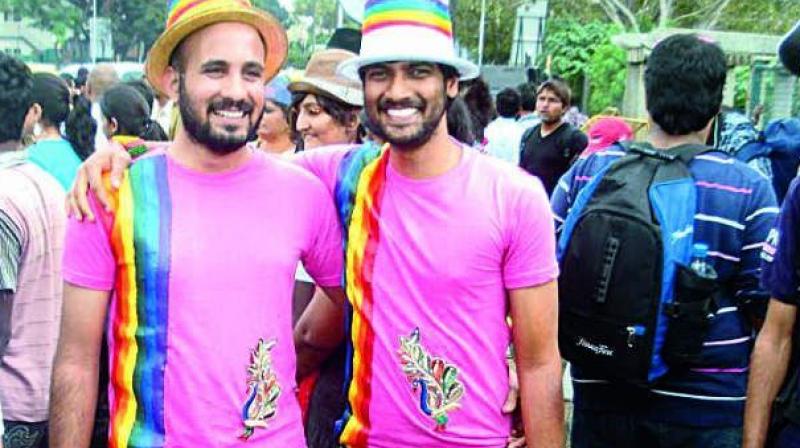CJI Dipak Misra hints in favour of decriminalisation of Section 377
Once the court decriminalises Section 377, then the discrimination faced by the LGBT community in employment will vanish, CJI said.

New Delhi: The Union Government on Wednesday decided to leave it to the “wisdom of the Supreme Court” to declare Section 377 -- criminalisation of consensual gay act -- between two adults as unconstitutional or not.
Additional Solicitor General Tushar Mehta made this submission before a five-judge Constitution Bench comprising of Chief Justice Dipak Misra and Justices Rohinton Nariman, A.M. Kanwilkar, D.Y. Chandrachud and Indu Malhotra hearing a batch of petitions on the validity of Section 377 of the Indian Penal Code (IPC).
On the outset, CJI Dipak Misra told the ASG, “We intend to rule, subject to arguments, that two consenting adults even if engaged in 'unnatural sex' will not be liable for prosecution for any offence.”
Replying to ASG’s submission on Centre’s stand, the CJI said, "So you are leaving it to our wisdom whether Section 377 deals with crime and whether it should be treated as a crime or not we will deal with it?"
During the hearing on Tuesday, there was enough indication in favour of de-criminalising Section 377 of IPC and taking note of this the Centre decided not to spell out its stand one way or the other.
Referring to Justice Chandrachud’s observation on Tuesday that right to choose a partner would also include right to choose partner from the same sex, the ASG said, “This may encourage other forms of sexual perversions such as incest, and relationships within the prohibited degrees and between 'sapindas’, which are restricted under the Hindu Marriage Act.
The CJI said, "We are on consensual sex between two adults, considering that the bar on incest and bestiality stood."
Justice Chandrachud replied, “There is no fundamental right to sexual orientation but only to the choice of sexual partner. The scope is limited to the mainstream orientation in respect of which the history has spoken. Our focus is not only on sexual act but the relationship between two consenting adults and the manifestation of their rights under Articles 14 and 21. We want the relationship to be protected under fundamental rights and to not suffer moral policing.”
It must be noted that even during the hearing by a two-judge bench in February/March 2012 the then UPA government did not take any categorical stand and left it for the court to decide.
The two-judge bench ultimately upheld this provision by setting aside the Delhi High Court verdict, which de-criminalised gay sex.
In its brief affidavit, the Centre said the only question which is referred for the consideration of larger bench is the constitutional validity of criminalizing “consensual acts of adults in private” falling under Section 377 of the IPC.
The affidavit clarified that if this Court is pleased to decide to examine any other question other than the constitutional validity of Section 377, or to construe any other right in favour of or in respect of LGBT, the Union of India would like to file its detailed affidavit in reply.
It said consideration of other issues would have far-reaching and wide ramifications under various other laws and also will have consequences, which are neither contemplated in the reference nor required to be answered by this Bench.
The CJI told the ASG, “We will strictly confine it to the constitutional validity of Section 377. We will not give any ruling on corollary rights of LGBT community, relating to their marriage or other ancillary civil rights.”
Counsel Menaka Guruswami, appearing for a group of IITians, argued that Section 377 curtails the freedom of expression and the right to form an association of a sexual minority.
The CJI observed, “Once the court decriminalises Section 377, then the discrimination faced by the LGBT community in employment or choosing any vocation will vanish. After the decriminalisation of Section 377, the LGBT community members can freely contest elections without inhibitions. This will help to awaken the society and help the LGBT community to live life to the fullest.”
Guruswami said prohibition of discrimination on the basis of sex under Article15 of the Constitution includes sexual orientation. Discrimination revolves around the sex of a partner and therefore section 377 violates Article15 of Constitution, which must be interpreted in a broad and not narrow sense.
The court must interpret the constitution in such a manner that it allows citizens to enjoy the rights guaranteed under it.
Guruswami also added that Section 377 IPC has a chilling effect, impoverishes discourse, cripples sexual minority groups and is a terrible colonial legacy.
Punishing consensual acts between adults is grossly disproportionate, and its continuation is an instance of non-application of legislation of mind, she said. She also urged the court to emancipate a class of people who have not been given the promises of our Constitution by declaring this provision as unconstitutional.

